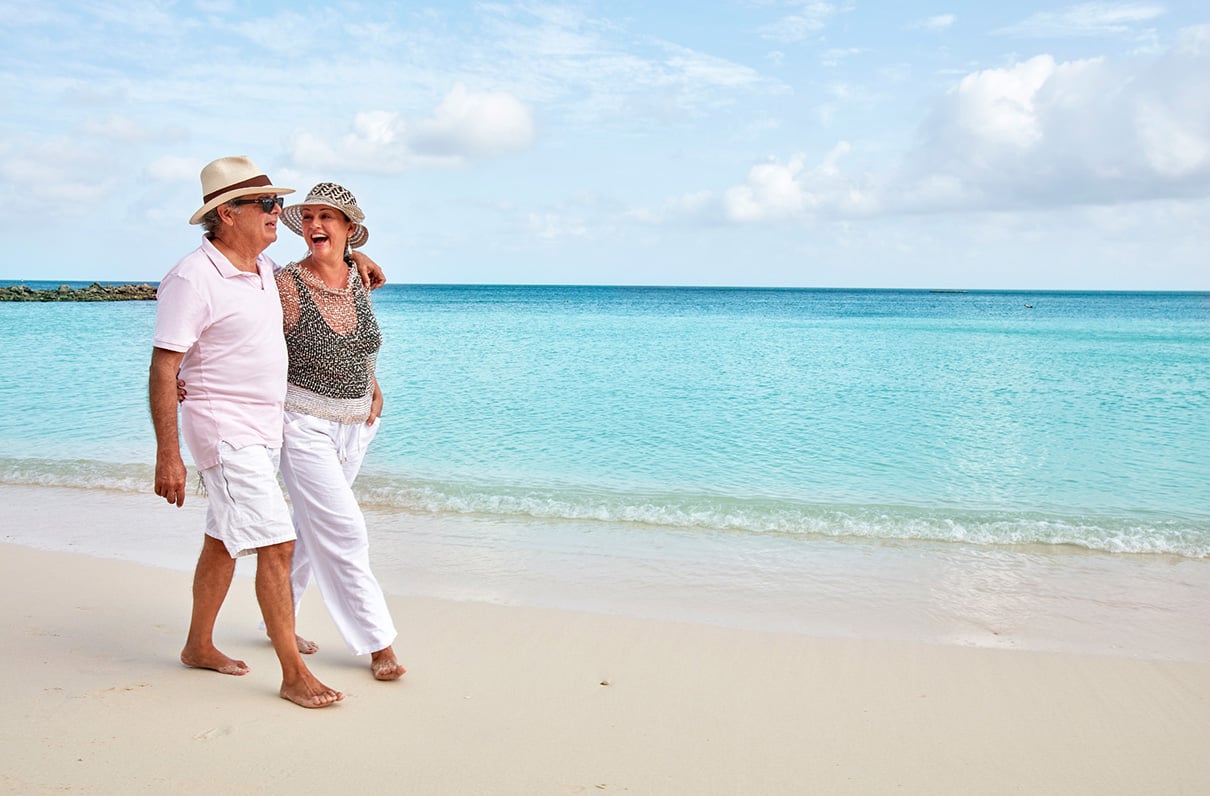Vacations for senior citizens offer a unique opportunity to explore the world, relax, and create lasting memories. However, planning a trip that caters to the specific needs and preferences of older travelers requires careful consideration. This guide delves into the essential aspects of planning a fulfilling and safe vacation for senior citizens, covering everything from budgeting and health considerations to choosing the right destination and selecting appropriate activities.
From selecting accessible destinations and transportation options to budgeting effectively and ensuring safety, we provide practical advice and resources to help seniors embark on memorable journeys. We’ll explore diverse vacation types, suitable activities, and essential packing tips, ensuring a smooth and enjoyable experience for every senior traveler.
Types of Vacations for Seniors
Planning a vacation for senior citizens requires careful consideration of their physical abilities, interests, and budget. Choosing the right type of vacation can significantly enhance their travel experience, ensuring both relaxation and enjoyment. This section details various vacation options, outlining their advantages, disadvantages, and crucial accessibility features.
Vacation Types for Seniors: A Comparative Overview
The following table categorizes various vacation types suitable for senior citizens, considering activity levels, cost, and special needs.
Check what professionals state about resepi kek gulung sukatan cawan and its benefits for the industry.
| Destination | Activity Level | Cost Range | Special Considerations |
|---|---|---|---|
| All-Inclusive Resort (e.g., Caribbean, Mexico) | Low to Moderate | Mid-range to High | Accessibility features vary widely; check for ramps, elevators, and accessible rooms. Consider proximity to amenities. |
| Cruise | Low to Moderate | Mid-range to High | Look for ships with accessible cabins and amenities. Seasickness can be a concern; consider medication options. |
| National Parks/Scenic Drives (e.g., US National Parks) | Low to Moderate (depending on chosen activities) | Low to Mid-range | Accessibility varies significantly between parks. Prioritize accessible trails and viewpoints. Consider renting a vehicle with accessibility features. |
| European River Cruise | Low | Mid-range to High | Generally more accessible than ocean cruises, with easier embarkation and disembarkation. However, still check accessibility features on specific ships. |
| Relaxation Retreat (e.g., Spa Resort) | Low | Mid-range to High | Focus on resorts with accessible spa facilities and rooms. Consider the availability of assistance for treatments. |
| Domestic Road Trip (e.g., scenic coastal routes) | Low to Moderate (depending on itinerary) | Low to Mid-range | Plan shorter driving days and incorporate frequent stops. Consider renting an accessible vehicle. Pre-book accessible accommodations. |
Advantages and Disadvantages of Vacation Types
Each vacation type presents unique advantages and disadvantages for senior travelers. For instance, all-inclusive resorts offer convenience and ease, but may lack the cultural immersion of other options. Cruises provide diverse activities, but can be susceptible to seasickness. National park visits offer breathtaking scenery, but require careful planning for accessibility. A relaxation retreat promotes well-being, but might not appeal to those seeking adventure.
Domestic road trips offer flexibility but require careful consideration of driving distances and potential fatigue. European river cruises offer a balance between sightseeing and relaxation, but may require more planning regarding accessibility features.
Accessibility Features: Crucial Considerations
Accessibility is paramount for senior travelers. When planning a vacation, prioritize destinations and accommodations that offer features such as ramps, elevators, accessible restrooms, grab bars in bathrooms, wider doorways, roll-in showers, and accessible transportation. Furthermore, readily available assistance for mobility, such as wheelchairs or walkers, should be confirmed in advance. Clear communication regarding accessibility needs with travel providers is essential to ensure a smooth and enjoyable experience.
For example, many airlines now offer pre-boarding for senior citizens and those with disabilities. Similarly, many hotels and resorts offer accessible rooms upon request, but early booking is recommended.
Budgeting and Financing Senior Vacations
Planning a vacation requires careful consideration of costs, especially for seniors on fixed incomes. This section details budgeting strategies and financing options to ensure a memorable and affordable trip. Understanding these factors will help seniors maximize their travel budget and minimize financial stress.
Sample Budget Breakdown for a Week-Long Senior Vacation
A week-long vacation can vary greatly in cost depending on location and travel style. The following is a sample budget for a moderately priced trip to a domestic destination, providing a framework for personalized planning. Remember to adjust these figures based on your chosen destination and preferences.
| Category | Estimated Cost | Notes |
|---|---|---|
| Accommodation (7 nights) | $700 | Mid-range hotel or vacation rental; consider discounts for seniors. |
| Transportation (round trip) | $300 | Flights or driving; factor in gas costs if driving. Look for senior discounts on airfare. |
| Activities and Entrance Fees | $200 | Museums, tours, shows; consider free or low-cost options. |
| Meals (7 days) | $400 | Mix of dining out and self-catering to save money. |
| Miscellaneous (souvenirs, tips) | $100 | Allocate funds for unexpected expenses. |
| Total Estimated Cost | $1700 | This is an estimate; costs may vary depending on the destination and individual choices. |
Financing Options for Senior Vacations
Several financial strategies can help seniors fund their dream vacations. Careful planning and comparison shopping are key to finding the most suitable option.
| Financing Option | Description | Pros | Cons |
|---|---|---|---|
| Savings Plans | Regular contributions to a dedicated savings account. | Consistent savings, avoids debt. | Requires long-term planning. |
| Travel Insurance | Covers unexpected events like cancellations or medical emergencies. | Peace of mind, financial protection. | Additional cost. |
| Senior Discounts | Many travel providers offer discounts for seniors. | Cost savings on flights, accommodation, and activities. | Availability varies; requires proof of age. |
| Credit Cards with Travel Rewards | Accumulate points or miles for travel expenses. | Potential for significant rewards. | Risk of accumulating debt if not managed carefully. |
Finding Affordable Accommodations and Travel Deals for Seniors
Seniors can significantly reduce their travel costs by utilizing various resources and strategies.Several websites and travel agencies specialize in offering discounts and deals tailored to senior travelers. These platforms often feature last-minute deals, package offers combining flights and accommodation, and exclusive discounts for seniors. Additionally, exploring alternative accommodations such as vacation rentals or guesthouses can offer significant savings compared to hotels.
Consider traveling during the off-season or shoulder seasons to avoid peak pricing and crowds. Finally, leveraging senior discounts offered by airlines, hotels, and attractions can further reduce the overall cost of the trip.
Communication and Support During Travel: Vacations For Senior Citizens

Planning for seamless communication and readily available support is paramount for senior citizens embarking on vacations. A well-defined communication strategy minimizes anxieties and ensures a safe and enjoyable trip. This involves proactive measures before departure, dependable systems during travel, and efficient follow-up upon return.Maintaining consistent contact with family and friends back home is crucial for peace of mind.
Unexpected situations can arise, and a clear communication plan facilitates swift responses to any challenges encountered during the trip. This also allows seniors to share their travel experiences and reassure loved ones of their well-being.
Emergency Contact and Support Systems, Vacations for senior citizens
Establishing a robust emergency contact system is a non-negotiable aspect of senior travel planning. This involves providing detailed itinerary information to a designated contact person, including flight numbers, hotel details, and planned activities. Sharing a copy of the itinerary with multiple trusted individuals ensures that help can be accessed quickly should the need arise. Consider registering with your country’s embassy or consulate in your destination country; this provides an additional layer of support in case of unforeseen circumstances.
Furthermore, pre-arranging local emergency contacts, such as a doctor or translator, can prove invaluable in navigating unfamiliar environments. Travel insurance policies frequently provide 24/7 emergency assistance services, including medical evacuation and repatriation.
Utilizing Technology for Connectivity
Technology plays a vital role in maintaining communication and access to information while traveling. A mobile phone with international roaming or a local SIM card enables easy contact with family and friends. Many mobile phone providers offer international travel packages to reduce communication costs. Consider using communication apps such as WhatsApp or Skype for cost-effective video calls and messaging.
GPS tracking apps can provide location information to loved ones, enhancing safety and providing peace of mind. Downloading offline maps and translation apps can also be beneficial in navigating unfamiliar areas and overcoming language barriers. Finally, utilizing wearable technology such as medical alert bracelets with GPS tracking can provide an extra layer of security in case of emergencies.
Planning a vacation for senior citizens requires thoughtful preparation, but the rewards are immeasurable. By carefully considering factors like budget, health, accessibility, and preferred activities, seniors can enjoy enriching travel experiences that create lasting memories. This guide aims to empower senior travelers to confidently plan and execute unforgettable journeys, promoting independence, well-being, and the joy of exploration.


